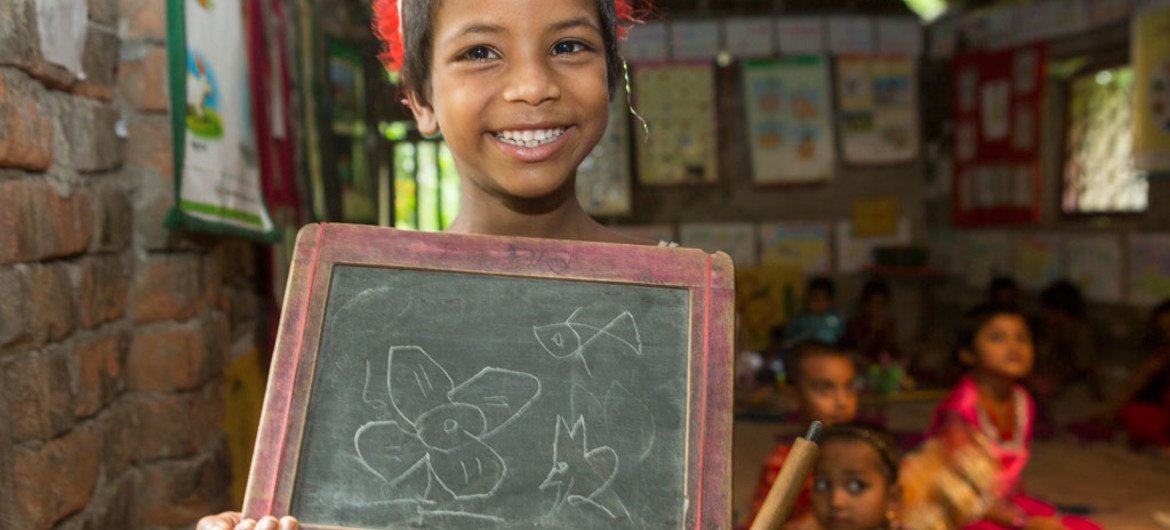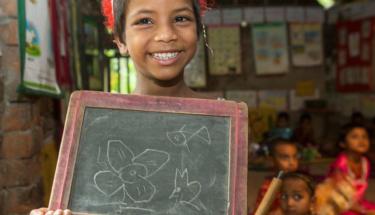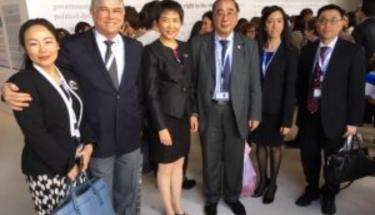
Organised by DESA and the Ministry of Housing and Urban Development (MIDUVI), Ecuador, in conjunction with the United Nations Conference on Housing and Sustainable Urban Development (Habitat III)
Quito, Ecuador, 16 October 2016, 1:00 PM - 5:30 PM
Quicklinks:
Background
Urbanization is one of the most significant global trends of the 21st century. With 60 per cent of the world’s population predicted to be living in cities by 2030, it is a growing force that is influencing and transforming development in many parts of the world – in both developed and developing countries. Although urbanization may bring cities and countries solutions to address many challenges such as poverty, inequality, environmental sustainability, and social development, it can potentially exacerbate vulnerability, marginalization, and socioeconomic exclusion.
For the estimated one billion persons with disabilities across the world, towns and cities often present a combination of physical, environmental, technical and social barriers to physical and virtual infrastructures, facilities and public services. Poor planning and unregulated urban development can have particularly devastating consequences for persons with disabilities. Lack of access to basic services and facilities pose significant obstacles to inclusion and participation in everyday life and development and can prevent persons with disabilities from escaping poverty and inequality.
Making cities and towns accessible and inclusive for all people, including persons with disabilities, is essential for sustainable urban development. The United Nations General Assembly adopted a new international framework for development, “Transforming our world: the 2030 Agenda for Sustainable Development” in September 2015. World leaders recognized the importance of sustainable and inclusive cities in the Eleventh Sustainable Development Goal, emphasizing, among other issues, the importance of accessibility and inclusion for persons with disabilities in urban development contexts. In this regard, they recognized the need for an inclusive approach to urban development and human settlements that facilitates full and effective participation of all.
Accessibility is broadly understood as products, services, built environments and information communication technologies that respond to the interests, needs and capabilities of a wide range of end users, persons with disabilities and many other urban dwellers with access needs in particular. To a great extent, accessibility is a collective good that benefits all and should therefore be considered a central component of good policy to achieve inclusive and sustainable urban development. A city that is well designed is well designed for all.
In the follow up to the adoption of the 2030 Agenda for Sustainable Development, the international community is now faced with the challenge of operationalizing the ambitious goal of building in a sustainable and inclusive way, to create the future we want in the contexts of urbanization.
High Level Forum on Disability Inclusion and Accessible Urban Development
The United Nations Department of Economic and Social Affairs (DESA), through its Division for Social Policy and Development (DSPD), and the Ministry of Housing and Urban Development (MIDUVI) of the Republic of Ecuador, in partnership with the United Nations Secretary General’s Special Envoy on Disability and Accessibility, UN Habitat III Secretariat, Essl Foundation, The Nippon Foundation, Global Alliance on Accessible Technologies and Environments, Rehabilitation International, the Global Network on Disability Inclusion and Accessible Urban Development and Disabled People’s International, will convene a High Level Forum on Disability Inclusion and Accessible Urban Development in Quito, Ecuador on 16 October 2016 in the lead up to the HABITAT III.
Venue and dates of the side event
The High Level Forum will be held at Room A, UN Pavilion, Quito, Ecuador, 1 – 6pm, on 16 October 2016, Sunday, Ecuador.
Participation
The High Level Forum will be attended by high-level experts and representatives of government agencies, local authorities, the private sector, civil society, academia, and the United Nations System, working in the field of disability-inclusion and accessible urban development. The total number of participants is expected to be around 150, including around 50 from outside of Ecuador.
Objectives
The aims of the High Level Forum on “Disability Inclusion and Accessible Urban Development” are to promote the world´s urban development to be inclusive and accessible to persons with disabilities as well as to contribute to the emerging “New Urban Agenda” and its implementation. More specifically, the Forum is expected to:
(1) Engage national governments, local authorities, urban policy makers and practitioners, to ensure that the New Urban Agenda will be genuinely inclusive of and accessible to all, particularly to persons with disabilities.
(2) Support Member States and civil society, in particular representative organizations or groups of persons with disabilities (DPOs), to facilitate participatory decision-making processes and the advancement of a disability-inclusive urban agenda.
(3) Exchange of practical and technical expertise as well as of best practices and call for commitments for actions to further advance accessible and integrated urban planning and construction, including through innovations for effective implementation of the New Urban Agenda for building inclusive cities for all.
Expected outcome
The inclusion of persons with disabilities and accessibility issues in urban agenda is recognized as essential to the success of the 2030 Agenda for Sustainable Development, but is also a human rights imperative. The discussions and its outcome from the High Level Forum will provide a set of recommendations that could make concrete contribution to the Habitat III Conference and to the implementation of the New Urban Agenda.
A summary of key outcomes and recommendations and commitments for actions from the Forum will be published after the event. All meeting materials, including presentations, will be made available on the United Nations Enable website http://www.un.org/disabilities/
Organization of work (downloadable program)
The tentative program will be organized as follows:
-
- Opening: keynote addresses and presentations will review current urban development policies and practices from a disability perspective at the global, regional, and national levels. Additionally, lessons learned in promoting accessibility and disability inclusion in urban development are reviewed.
- Expert and practitioner panel: Review policy framework in terms of universal design in urban planning, accessibility standards and national and international legislations as well as lessons and experience as well as good practices learned in planning and building accessible and inclusive cities in key areas such as: urban infrastructure, housing, public spaces, transportation, access to information and communication. Also, the role of national and local governments as well as representative organizations or groups of persons with disabilities (DPO´s) will be highlighted.
- Closing: Presentations of findings and recommendations as well as commitments for actions on promoting accessibility and disability inclusion in the New Urban Agenda and its implementation are issued.
Opening
Mr. Wu Hongbo, Under-Secretary-General of the Department of Economic and Social Affairs, United Nations
Ms. Fang Liu, Secretary-General, International Civil Aviation Organization (ICAO)
Mr. Yohei Sasakawa, Chairman, The Nippon Foundation
Session 1
Mr. Joseph Kwan (UDA, Hong Kong China/ Rehabilitation International)
Ms. Jutta Treviranus, Inclusive Design Institute, Canada
Ms. Maria Soledad Cisternas Reyes (Committee on the Rights of Persons with Disabilities)
Mr. Ali Khan, League of accessible cities, European Foundation Centre
Mr. Ciro Ugarte, WHO/ Pan American Health Organisation, Washington DC
Session 2
Part 1
Ms. Bastienne Paliz, Ecuador for All
Mr James Aniyamuzaala, African Youth with Disability Network
Ms. Lalita Sen, Department of Urban Planning & Environmental Policy, Texas Southern University
Mr. Sergio Scarabino (International Telecommunication Union)
Part 2
Ms. Susan Parker (Rehabilitation International)
Ms. Janett Jimenez-Santos, Global Alliance on Accessible Technologies and Environments (GAATES)
Ms. Silvia Perel-Levin (General Assembly of Partners – Older Persons)
Mr. John Honney (The Nippon Foundation) and Bmaps presentation
Languages
The High Level Forum will be conducted in English, with Spanish interpretation. Real-time closed caption will be provided.
Contact
For further information, please contact Mr. Eric Guozhong Zhang, Secretariat for the Convention on the Rights of Persons with Disabilities of DSPD, UNDESA, E-mail: @email, and copy Ms. Talin Avades, email @email.
-
- Good Practices of Accessible Urban Development (Word Version, 65MB: PDF Version, 3MB )
- Accessibility and Inclusion of Persons with Disabilities in Urban Development (Issue paper)
- Accessibility and Development: Mainstreaming disability in the post-2015 development agenda (UNDESA publication ST/ESA/350)
- Info-graphic on Disability and Accessible Urban Development
- The Inclusion Imperative: Towards Disability-inclusive and Accessible Urban Development. Key Recommendations for an Inclusive Urban Agenda. Disability Inclusive and Accessible Urban Development Network (DIAUD)
 Welcome to the United Nations
Welcome to the United Nations

